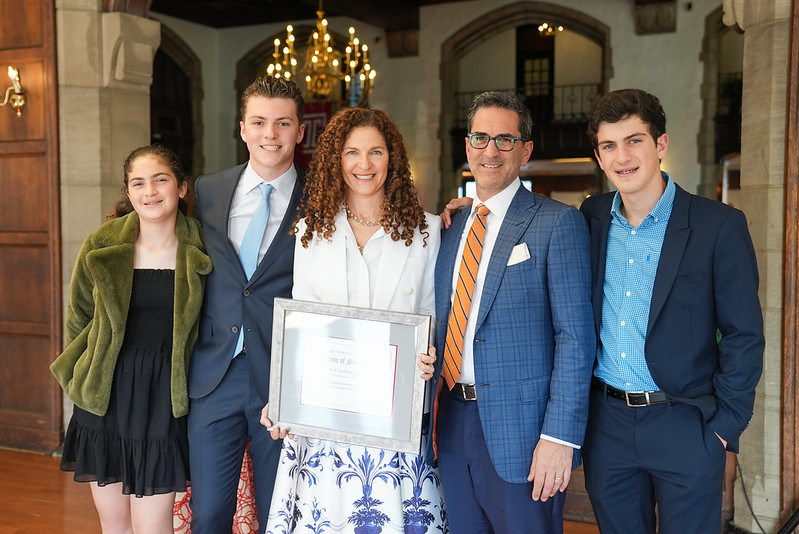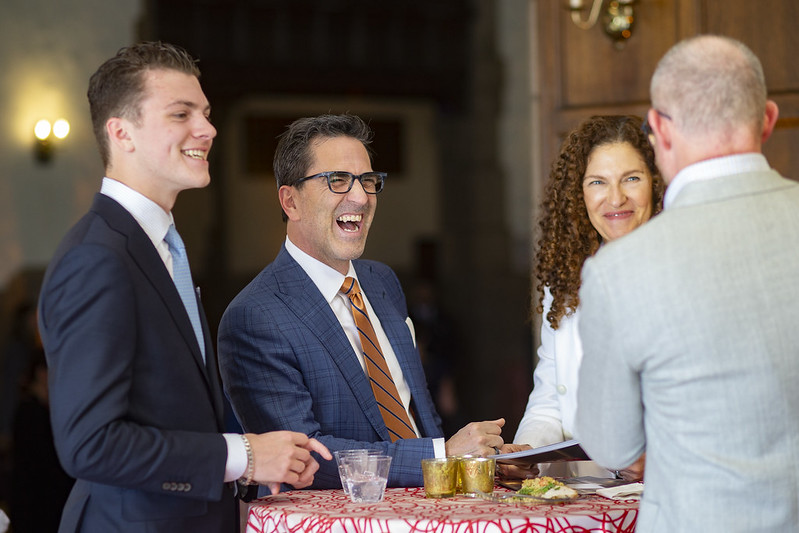Since 2005, Julie Copeland, MBA ’99, has acted as the CEO of Arbill in Philadelphia. Arbill provides safety products and services to industry and government agencies including hand protection, fall protection and other PPE products to ensure everyone makes it home safely. She is the third-generation owner of Arbill.
As the leader of a company that specializes in providing protection for those who need it most during the pandemic, Copeland has had to be innovative and agile in the face of adversity to continue to provide Arbill’s clients with the products they need. For this work and much more, she was recognized as the Fox School of Business Gallery of Success honoree for 2022.
Every year, each school and college within Temple University recognizes one alumnus who represents excellence within their chosen field. This is one of the highest honors a school or college can bestow on an alumnus.
To celebrate this high honor, we spoke to Copeland about her experience in the Executive MBA program, mentorship and her leadership at Arbill.

Tell me about your time in the Executive MBA program.
After finishing my broadcast journalism degree from Syracuse, I realized that I really loved business and I did not get enough of that in my undergraduate program. I needed to work at the same time, and the Fox School provided me with an evening program. What I loved about that is that everyone that I was in classes with also was working, so we could commiserate and talk about our workloads. It was great to be around such like-minded people. They are still dear friends of mine to this day.
My capstone project was a terrific experience; we evaluated several technology companies. At the time, ERPs (enterprise resource planning software) was not really around yet. We investigated several ERP systems and identified Oracle, which was kind of a lesser-known company at the time, as our top ERP business. We all thought it was going places based on our evaluation of their business strategies, financials, cash and leadership team. Each of us invested whatever little money we had to buy stock in the company because we were convinced it was poised for great things thanks to this great capstone project.
You acted as a mentor for a full-time student in the MBA program recently. How was that experience?
It was wonderful. It is great to see and hear how a student thinks today and what makes them nervous or raises concern. One of the things that I think the mentorship program does for them helps create greater awareness around that interview process and getting a job and how they go about getting the job, I think that piece of it feels incredibly overwhelming. By helping them through that, letting them have a place to ask those questions helps a bit.
For example, when my company is recruiting, we’ve talked through what our needs are very specific and it helps them better appreciate matching up their skills with the actual job opening. I’ve helped them through that process and thinking about how the first job they land matters. You are going to get experience; does that experience help you get to where you really want to go? If it does, you are better positioned to end up with a company that has a career path that matched your areas of interest. If all is unknown, we have talked through possible paths they can pursue.
What is your advice for current students and recent graduates?
I think the greatest thing you can do, while you’re in school, is to determine what you really love. And, more than anything, do some of that soul searching. During school, your job is to learn who you are. You’ve got to spend time on who you are, and in doing so it helps you determine what will you really enjoy and what makes you tick. If you don’t find that, your job opportunities will be limited. When you can demonstrate a passion for what you’re going after, your employer will pick up on that and you will soar.
Looking back to 2005 when you became CEO, what would you tell your younger self?
I would tell my younger self that everyone is good, to see good in everyone. Everyone serves a purpose. However long or short our time together is, everyone serves a meaningful purpose. The other thing is to keep listening and learn to listen. Be an active listener to those around you.
I also learned that you don’t have to be the smartest person in the room and to surround yourself with great people.
How has COVID disrupted your business and how has your company pivoted to support its customers? How did you and your senior management team support employees?
In the beginning, we worked some of the longest days we’ve ever worked in our history because we were in the thick of it. Everything was about personal protective equipment or PPE—that wasn’t a name or three initials that anyone but us knew about previously.
For employees, we made sure everyone had what they needed at home, and we would have huddles to check in on everyone’s mental health and well beings. We started doing fun things. In April of 2020, my son helped me call local pizza shops where all my employees were located so we could surprise them with dinner for the family one Friday night. We had some good laughs from that one. We sent cupcakes, hot chocolate kits, jackets, t-shirts, candy and more. Really wanted to reach out and send some love and confirm for everyone we are all in this together.

Tell me about your entrepreneurial approach to solving business challenges.
So I’ll give you an example of a business challenge I’m in right now.
During COVID, I made a few assumptions. I assumed we would all go back to the office, but here we are, a lot of us still working from home. Number two was that employers would need to protect all employees, including office workers. Number three was that face coverings would be considered a PPE item, and that protection would be more important than fashion.
Based on those beliefs, I invested in creating a face covering that we perceived to be a PPE product. We tested it for breathability and for filtration. We made sure it was incredibly comfortable, that you could wash it 50 times and that it wouldn’t fill landfills because it decomposes in six months. An outstanding product that protected some fortune 100 clients that protected their employees but not all, my theories didn’t pan out as planned.
So now I have a lot of face coverings, and the industrial market for masks is flooded. So I pivoted to sell to retail—an industry I knew nothing about. We created great packaging and spoke to retailers but they have so much of their own inventory, so I remain with the products that I truly believe in but in the process, I learned a lot about retail. I noticed in talking to retailers that glove sections really weren’t catering to a certain market, so we’re now bringing a whole new glove line to consumers. I would have never approached this new business vertical had I not been met with these challenges. And, once there is a need for high-quality masks that are environmentally friendly, I have a great solution.
My philosophy here is that I have a brick wall in front of me that’s all this inventory, but to always find the door. Find a window, find a key, find another way. Don’t ever give up—just find another way and try.
